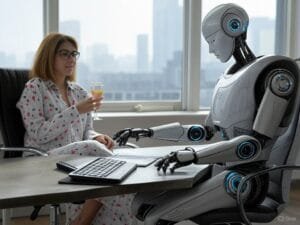AI Danger: Are We All Going to End Up Stupid?
Is AI truly the solution—or a hidden threat? The more we rely on it, the more we risk losing our ability to think independently.
The other night, while chatting with my eldest son—who’s a med student and theoretically using his brain quite a bit—he said, somewhere between two ChatGPT-assisted research tasks: “Don’t you think if we keep giving everything to AI, we’re kind of becoming lobotomized? Like… AI could actually be dangerous, couldn’t it?”
At first, I laughed. Then I paled. Thinking about my own use of ChatGPT & Co., I wondered: what if, by outsourcing our summaries, analyses, even strategic decisions to algorithms, we were slowly unplugging our own intelligence—without even noticing?
And it’s not just students. Employees, managers, CEOs… no one is exempt. Because soon, AI won’t be optional. And the real danger AI poses may not be some sci-fi fantasy. It’s already happening—quietly, slowly, but inevitably.
When Tech Makes Us (a Little) Dumber
The “I-Don’t-Remember-Anything-Anymore” Syndrome
Remember when we knew phone numbers by heart? Did math in our heads? Since then, GPS, smartphones, and apps have turned our memory into a lazy couch potato: “No worries, I’ll Google it.”
AI is doing the same—but on steroids.
It’s not just spoon-feeding information anymore. It thinks for us, summarizes, analyzes, chooses the best option… while we vaguely tap away on keyboards in cognitive tourist mode.
At Work: Productivity Boost or Intellectual Regression?

In the professional world, AI is creeping in everywhere: email writing, meeting summaries, data analysis, translations, pitch decks… And yes, it’s thrilling—I won’t lie, I use it a lot. But when we delegate too much, we stop producing—we become supervisors.
Think about it:
- The writer doesn’t write—just nudges the AI.
- The manager doesn’t prepare briefs—just generates them.
- The sales rep lets AI talk numbers—without grasping what they mean.
In the end, we’re piloting tools we don’t fully understand, using data we didn’t source, making decisions with consequences we don’t grasp. That’s where the AI danger becomes real.
The Real Threat: Forgetting How to Think
Critical thinking, perspective, raw creativity, working memory, intellectual rigor… These are mental muscles. And like all muscles, they wither when not used.
In a work context, that means:
- Culture gets diluted (we know how to find info—not always how to understand it).
- We lose the ability to formulate our own thoughts: AI ends up deciding what we want to say… and why.
- We become tool-dependent (good luck doing a presentation without your AI assistant).
- Worst of all? We risk becoming intolerant. If we stop questioning information, aren’t we more likely to shut down any divergent opinion?
Add to that: fake news, ideological warfare, corporate manipulation. Voilà: perfect target.
Use AI as a Lever, Not a Crutch
Yes, AI is powerful. But it’s not the one deciding if it makes you sharper… or lazier. That’s entirely up to you. As Julie Battilana, professor at Harvard and expert on power dynamics, puts it: reclaiming agency starts with understanding power relationships. With AI, that means keeping control—especially over our discernment.
My Personal Mental Hygiene Rules (Written for Me, Shared Just in Case)
I asked myself: what intellectual abilities do I refuse to lose? Here’s what I came up with:
- Preserve “low tech” zones: prepare a meeting by hand, write an article from instinct, think solo without assistance.
- Use AI as a second brain—not the primary one: challenge my own ideas before asking for help.
- Train my mental muscles: memory, critical thinking, argumentation. It’s tiring—just like sport—but it’s what keeps me sharp.
- Clarify my intention before delegating: What do I really want to say? To whom? Why? If I can’t answer, no machine should try.
- Keep learning AI and reflection: mastering the tool means knowing its limits. I found the MOOC Destination IA super useful. Highly recommended.
So What Can AI Really Do for Us?
AI can boost our ideas, lighten our workload, widen our perspectives. But it will never replace that inner spark—the one that turns reflection into vision, intuition into projects. Because AI doesn’t understand. It combines, predicts, imitates. But meaning, intuition, judgment, ethics, boldness? That’s on us.
In the end, AI is neither our sworn enemy nor a magic wand. It’s a tool—a powerful one, sure, but only as powerful as we allow it to be. The real danger AI represents isn’t the tech itself—it’s what we choose to give up, and the mental muscles we stop using.
So, what do we do? We switch the brain back on. We decide when AI helps us—and when it weakens us. Because the world of work isn’t waiting around for us to catch up. Because thinking is a radical act. And no machine will ever do it for us!




